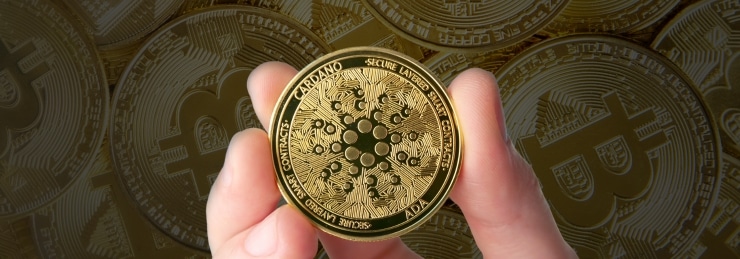- Home
- Crypto News
- What is Cardano (ADA) and how it differs from Bitcoin
What is Cardano (ADA) and how it differs from Bitcoin

Cardano is an up-and-coming cryptocurrency that is increasingly gaining traction in the realm of digital assets. This project was devised by an amalgam of academics and experienced professionals, aiming to generate a blockchain network that is fortified, resilient, and highly malleable. The principal token used on Cardano is denoted as ADA, and, as is consistent with other cryptos, it can be purchased through assorted exchanges.
Although Cardano and Bitcoin both employ blockchain technology and are decentralized, there is a key dissimilarity that enables them to be segregated. These discrepancies have enabled Cardano to gain recognition and position itself as a worthy adversary in the digital currency market. Concerning their base, Cardano and Bitcoin reveal a significant technical contrast.
As opposed to Bitcoin’s Proof-of-Work (PoW) platform, which guarantees transactions but leads to exorbitant electricity use and slow transaction speeds, Cardano uses a progressive system called Ouroboros Proof-of-Stake (PoS).
Understanding Cardano (ADA)
Charles Hoskinson, a founding father of Ethereum, unveiled Cardano in 2015 as a digital asset and blockchain-running system. Its goal is to formulate a more secure, flexible, and workable setting for decentralized applications (dApps) and intelligent contracts.
The appellation ‘Cardano’ pays homage to Gerolamo Cardano, a famous Italian mathematician, doctor, and thinker who made noteworthy advances to probability theory. Cardano is focused on safeguarding the utmost security and canvassing while furnishing an all-inclusive financial foundation to the public. This modern platform differentiates itself from other blockchain projects by scheming its engineering stack with instructional principles and academically authenticated investigations.
One major advantage of embracing Cardano for the casino industry is its concentration on interoperability. Its multi-layered construction boasting essential protocols, such as the settlement layer (CL), the computation layer (CLL), the transaction model (UTXO), the consensus algorithm (Ouroboros), together with the side chains infrastructure (Hydra), provides developers with the chance to modify their dApps to fit precise needs without encountering impediments posed by traditional blockchains. Thus, online casinos can incorporate modern-day technologies and expand their operations without a hitch.
Key Differences Between Cardano and Bitcoin
● Scalability:
Unlike Bitcoin, Cardano was engineered from scratch with expansion in mind. The restricted throughput capacity of Bitcoin causes exorbitant fees and sluggish transaction processing while there is high system usage. This has stunted its extensive approval as a reliable way of payment.
To tackle this matter, Cardano utilizes a stratified structure that differentiates bookkeeping, keeping, and processing into two distinct layers. The “Settlement Layer,” the highest layer, supervises transactions and announces account balances.
This layer is shielded by the Ouroboros Proof-of-Stake consensus protocol, which enables significantly faster transaction processing than the Bitcoin Proof-of-Work system. The “Computation Layer” forms the next stratum and controls the implementation of intelligent contracts and various other intricate computations.
● Consensus Mechanism:
Huge sums of money have been invested in Cardano and Bitcoin, two of the most well-known cryptocurrencies on the market. Both of these virtual currencies employ a consensus technique to guarantee the precision and security of each of their own blockchains.
However, the consensus procedures they have selected show a clear difference between them: Bitcoin employs Proof of Work, whereas Cardano uses Proof of Stake (PoS). The primary distinction between PoW and PoS is how recent blocks are made and uploaded to the network. With computing power, PoW miners compete with one another to solve difficult mathematical challenges.
● Smart Contracts:
DeFi operations depend largely on intelligent contracts, facilitating intricate and dependable blockchain trades. With its scripting language, Bitcoin started the path for the age of smart agreements, yet compared to other digital forms of money like Cardano, it holds restricted productivity.
In comparison with Bitcoin, Cardano proclaims a benefit by accommodating programming languages other than its customary local scripting language. Plutus, a smart contract stage, permits the development of reliable and verifiable smart contracts using utilitarian languages like Haskell and Solidity. This means developers with varying coding competencies can promptly generate intricate smart contracts that meet their requirements.
Growing Trend Of Cardano-Based Casinos And Gambling Platforms
Blockchains have gained popularity in recent years as more and more businesses explore their possible applications. With increasing platforms opting to integrate blockchain technology into their operations, the online gambling business has demonstrated a special interest.
A common trend among these systems is using Cardano to power online Cardano casino and gambling websites. Cardano, a third-generation blockchain technology, has a unique architecture that helps online gaming.
Its Proof-of-Stake consensus process ensures quicker transfer speeds and reduced costs compared to other significant cryptocurrencies like Bitcoin or Ethereum. Because of this, it can handle the high volume of transactions required in the fast-paced world of online gaming.
Market Performance and Adoption
Cardano, sometimes known as ADA, is a decentralized blockchain platform that aims to strengthen the security and durability of digital transactions and smart contracts. Thanks to its innovative design and cutting-edge technology, Cardano has seen a significant increase in market performance and acceptance since its launch in 2017.
In terms of market performance, Cardano has consistently been among the top cryptocurrencies by market capitalization. One ADA token is presently worth more than $0.25 because of the steady rise in price over the years. This is a phenomenal increase from its initial selling price of less than USD 0.02.
Conclusion
Cardano (ADA), a brand-new blockchain technology, aims to solve the scalability issues that Ethereum and Bitcoin experienced before it. It employs a proof-of-stake technique, encouraging improved security and rapid transaction processing.
It also differs from other cryptocurrencies because it focuses on scholarly study and peer-reviewed development. One of the key differences between Cardano and Bitcoin or Ethereum is its layered architecture, which separates the network into several components for improved speed. Additionally, it enables upgrades without resulting in a widespread outage.
Donald Weaver
Donald Weaver is the news reporter for CryptoEighty. Here, he contributes technical chart-based price updates and analysis pieces on world's leading digital currencies. he holds graduate degree in journalism. He is passionate about blockchain technology and it's public use cases.Latest News
All Latest News-
Want to Try Crypto? Get Started with Free Solana!
8 months ago




